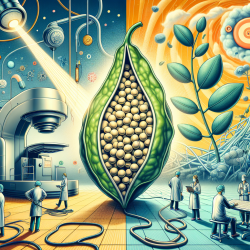Introduction
Radiation therapy is a cornerstone in the treatment of various cancers, including lung cancer. However, a significant challenge faced by practitioners is the management of radiation-induced esophagitis, a painful and potentially debilitating side effect. Recent research published in Frontiers in Oncology highlights a promising solution: soy isoflavones. This blog explores the findings and implications of the study, providing practitioners with data-driven insights to enhance patient care.
The Research
The study conducted by Fountain et al. (2015) investigated the effects of soy isoflavones on radiation-induced esophagitis in a murine model. Mice were subjected to thoracic irradiation with doses of 10 Gy or 25 Gy, and treated with soy isoflavones. The results were compelling, showing that soy isoflavones significantly mitigated the thickening of esophageal tissue layers and reduced leukocyte infiltration, which are key indicators of esophagitis.
Key Findings
- Reduced Tissue Damage: Soy isoflavones limited the extent of tissue damage in the esophagus, preserving the integrity of various tissue layers.
- Decreased Inflammation: The treatment reduced leukocyte infiltration, suggesting a reduction in inflammatory response.
- Potential Clinical Application: The findings suggest that soy isoflavones could be integrated into clinical protocols to alleviate esophagitis symptoms in patients undergoing radiotherapy.
Implications for Practice
For speech-language pathologists working with children undergoing radiation therapy, these findings offer a new avenue for intervention. By incorporating soy isoflavones into the dietary regimen of patients, practitioners can potentially reduce the severity of esophagitis, thereby improving swallowing function and overall quality of life.
Encouraging Further Research
While the study provides promising results, further research is needed to explore the long-term effects and optimal dosing of soy isoflavones in human subjects. Practitioners are encouraged to stay informed about ongoing clinical trials and emerging data to continually refine their therapeutic approaches.
Conclusion
Integrating soy isoflavones into the treatment plan for patients receiving radiation therapy could revolutionize the management of esophagitis. As practitioners, staying abreast of such advancements is crucial in providing the best possible outcomes for our patients.
To read the original research paper, please follow this link: Radiation-Induced Esophagitis is Mitigated by Soy Isoflavones.










